Related Research Articles

Giacomo Antonio Perti was an Italian composer of the Baroque era. He was mainly active at Bologna, where he was Maestro di Cappella for sixty years. He was the teacher of Giuseppe Torelli and Giovanni Battista Martini.
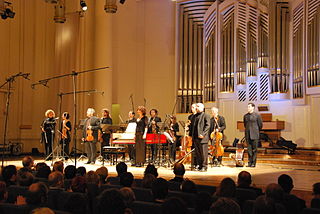
Europa Galante is the Italian period-instrument Baroque orchestra founded by violinist Fabio Biondi in 1990 and directed by him.
Dario Castello was an Italian composer and violinist from the early Baroque period who worked and published in Venice. As a composer, he was a late member of the Venetian School and had a role in the transformation of the instrumental canzona into the sonata.
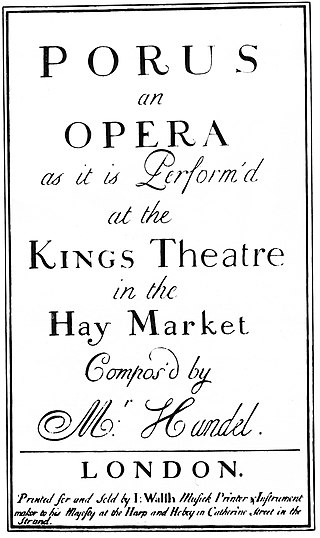
Poro, re dell'Indie is an opera seria in three acts by George Frideric Handel. The Italian-language libretto was adapted from Alessandro nell'Indie by Metastasio, and based on Alexander the Great's encounter with Porus in 326 BC. The libretto had already been set to music by Leonardo Vinci in 1729 and was used as the text for more than sixty operas throughout the 18th century.

Les Arts Florissants is a Baroque musical ensemble in residence at the Théâtre de Caen in Caen, France. The organization was founded by conductor William Christie in 1979. The ensemble derives its name from the 1685 opera Les Arts florissants by Marc-Antoine Charpentier. The organization consists of a chamber orchestra of period instruments and a small vocal ensemble. Current notable members include soprano Danielle de Niese and tenor Paul Agnew, who has served as assistant conductor since 2007. Jonathan Cohen is also on the conducting staff; Christie remains the organization's artistic director.
Sandrine Piau is a French soprano. She is particularly renowned in Baroque music although also excels in Romantic and modernist art songs. She has the versatility to perform works from Vivaldi, Handel, Mozart to Schumann, Debussy, and Poulenc. In addition to an active career in concerts and operas, she is prolific in studio recordings, primarily with Harmonia Mundi, Naïve, and Alpha since 2018.
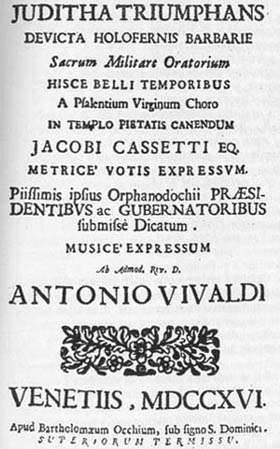
Juditha triumphans devicta Holofernis barbarie, RV 644, is an oratorio by Antonio Vivaldi. Although the rest of the oratorio survives completely intact, the overture has been lost. The Latin libretto was written by Iacopo Cassetti based upon the Book of Judith.

Philippe Jaroussky is a French countertenor. He began his musical career with the violin, winning an award at the Versailles conservatory, and then took up the piano before turning to singing.

Didone is an opera by Francesco Cavalli, set to a libretto by Giovanni Francesco Busenello. The opera was first performed at Venice's Teatro San Cassiano during 1640.

Roberta Invernizzi is an Italian soprano. She originally studied piano and double bass before turning to singing. She specialises in early music from the baroque and classical period of music.
Marco Lazzara is an Italian countertenor who sings a wide-ranging repertoire from baroque composers to those of the 20th century and has performed in a number of notable premieres and revivals of rarely performed operas. He has recorded widely on the Bongiovanni, Ricordi, Nuova Era, Forlane, Opera Rara and Dynamic labels.

La Dafne (Daphne) is an early Italian opera, written in 1608 by the Italian composer Marco da Gagliano from a libretto by Ottavio Rinuccini. It is described as a favola in musica composed in one act and a prologue. The opera is based on the myth of Daphne and Apollo as related by Ovid in the first book of the Metamorphoses. An earlier version of the libretto had been set to music in 1597–98 by Jacopo Peri, whose Dafne is generally considered to be the first opera.
Ensemble Elyma is an early music ensemble specialising in the baroque musical heritage of Latin America, led by Gabriel Garrido.
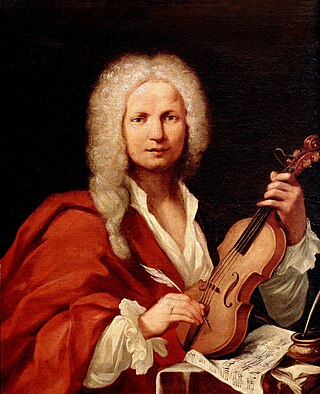
La Silvia is an dramma pastorale per musica in three acts by Antonio Vivaldi to an Italian libretto by Enrico Bissari. It was first performed on 28 August 1721 at the Teatro Regio Ducale in Milan on the occasion of the birthday celebrations of the Austrian Empress Elisabeth Christine, wife of Emperor Charles VI of Austria.
Bernadette Manca di Nissa is an Italian operatic contralto who has sung leading roles in the principal opera houses of Italy as well as internationally. She has appeared at La Scala in Milan, La Fenice in Venice, Teatro San Carlo in Naples, and the Maggio Musicale Fiorentino in Florence as well as at the Royal Opera House, Covent Garden, Gran Teatre del Liceu in Barcelona, Lyric Opera of Chicago, Festival of Salzburg, Matsumoto Festival, NHK in Tokyo, Sao Carlos Theater in Lisboa etc.

Maria Grazia Schiavo is an Italian classical soprano who is particularly known for her performances of music from the baroque period. She has performed with major opera houses in Austria, France, Germany, Italy, and Spain, and has appeared in concerts throughout Europe.

Kobie van Rensburg is a South African tenor and opera director.
David Hansen is an Australian countertenor.
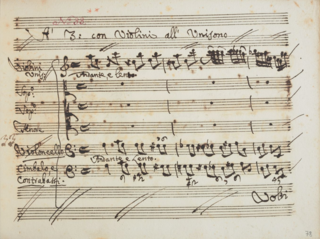
Carlo re d'Allemagna is a three-act dramma per musica by Italian composer Alessandro Scarlatti to a libretto by Giuseppe Papis, after Francesco Silvani, premiered at the Teatro San Bartolomeo of Naples on 26 or 30 January 1716. This is the composer's 79th opera out of 114 composed.
References
- ↑ Gramophone – Volume 68 Page 1893 1991 "Judith herself is sung by Gloria Banditelli whose Medea in Cavalli's Giasone (Harmonia Mundi, 7/89) impressed me very "